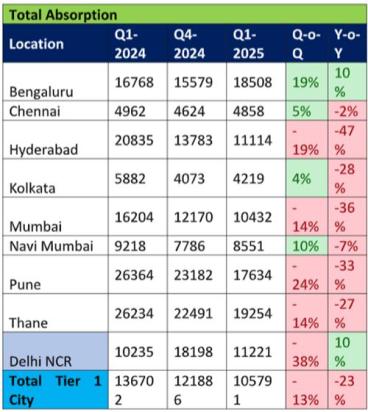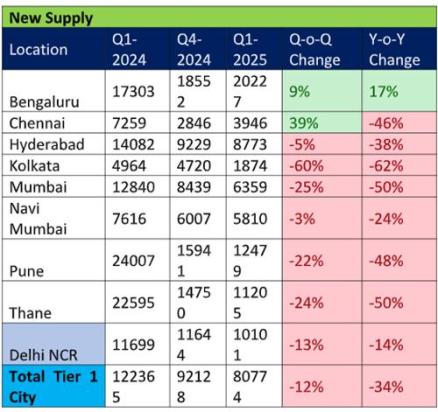The housing market continued its downward trend with housing sales in India’s top 9 cities falling by 23% while supply declining by a whopping 34% in Jan-March of 2025, said a report by data analytics firm PropEquity.
Housing sales in Q1 2025 stood at 1,05,791 units as compared to 1,36,702 units in the same period last year. Except Bengaluru and Delhi-NCR, all 7 cities witnessed a decline in sales.
Housing supply, on the other hand, stood at 80,774 units in Q1 2025 as compared to 1,22,365 units in the same period last year, marking three consecutive quarters of under-1 lakh units launched.
Except Bengaluru, all 8 cities saw a decline in new supply in the first quarter.
Also Read: Gold Loan vs Personal Loan: Which is better for small amounts?
Commenting on the report, Samir Jasuja, Founder & CEO, PropEquity said, “The housing market is witnessing some correction after three years (2021, 2022, 2023) of record supply because of which absorption / sales is also on a declining trend. Rise in home prices and caution on the part of investors due to geo-political developments and certain weaknesses in the Indian economy have resulted in drop in sales. However, the market has displayed strong demand as is evident from the healthy absorption to supply ratio, which stood at 131% in Q1 2025, 132% in Q4 2024 and 127% in Q3 2024.”
“The traditionally high supply markets – Hyderabad, Pune and Thane – continue to decline. These cities had the highest supply among all tier 1 cities for 2 years running 2022 and 2023 before touching a low in 2024. In this quarter, they cumulatively saw 28,227 units of lesser supply as compared to the same period last year. In fact, the share of the three cities to the total launches has come down from to 29% in Q1 2025 as compared to 38% in the same period last year,” he added.

* Housing sales increased by 10% to 18,508 units in Bengaluru in Q1 2025, with the city accounting for 17% of the total sales, rising from 12% in Q1 2024.
* Sales rose 10% in Delhi-NCR to 11,221 units in Q1 2025 with the city accounting for 11% of the total sales, rising from 7% in Q1 2024.
* Sales dropped the most in Hyderabad (47%), followed by Mumbai 36%, Pune 33%, Kolkata 28%, Thane 27%, Navi Mumbai 7% and Chennai 2%.

* Housing supply rose by 17% in Bengaluru to 20,227 units in Q1 2025. The city accounted for 25% of the total launches in Q1 2025, rising from 14% in the same period last year.
* It fell the most in Kolkata at 62% followed by 50% each in Mumbai and Thane, 48% in Pune, 46% in Chennai, 38% in Hyderabad, 24% in Navi Mumbai and 14% in Delhi-NCR.
Commenting on the findings of the report, Ankur Jalan, CEO, Golden Growth Fund, said, “The housing demand continues to be strong despite some visible slowdown and demand shifts in the last couple of quarters. With a new government taking charge in Delhi, we have seen a rise in enquiries for redevelopment especially in Cat-A colonies of Delhi, whose potential is worth upwards of Rs 2 lakh crore, as demand for villas and floors soars and safer real estate investment avenues with high yields are being looked into by investors.”
Ashish Sharma, AVP Operations, Brahma Group, said, “The 10% growth in housing sales in Delhi-NCR to 11,221 units in Q1 2025 is a testament to the region’s rising demand and sustained buyer confidence. Moreover, the city’s share of total sales increasing from 7% in Q1 2024 to 11% this year underscores its growing prominence in India’s real estate landscape. This surge reflects strong end-user and investor interest, driven by improved infrastructure, economic growth, and evolving lifestyle preferences. Furthermore, with positive market momentum and robust fundamentals, Delhi-NCR is poised for continued growth, making it a key destination for homebuyers and investors alike.”
Ashish Agarwal, Director, AU Real Estate, said, “The Delhi-NCR real estate market continues to thrive, with housing sales rising 10% in Q1 2025 to 11,221 units, reflecting the region’s robust growth trajectory. Accounting for 11% of total sales, up from 7% in Q1 2024, this surge underscores the increasing demand for luxury residential spaces and the region’s appeal among discerning buyers. Supported by continuous infrastructure development, such as the Noida Airport and metro expansions, Delhi-NCR remains a hub for both end-users and investors. This growth highlights the region’s resilience, economic vitality, and its emergence as a preferred destination for premium living and real estate investments.”

